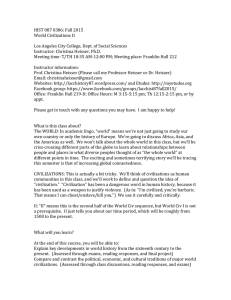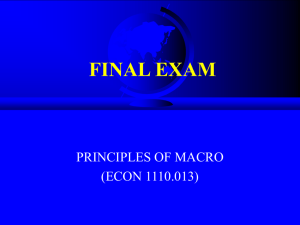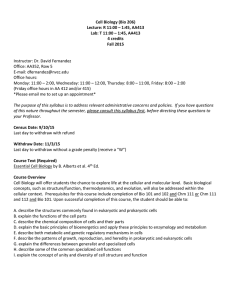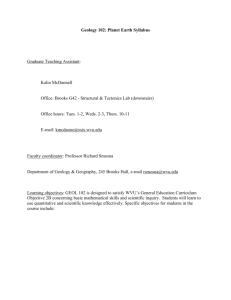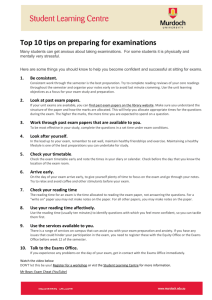World Civilizations II HIST 087 0369 Fall 2013 Los Angeles City
advertisement
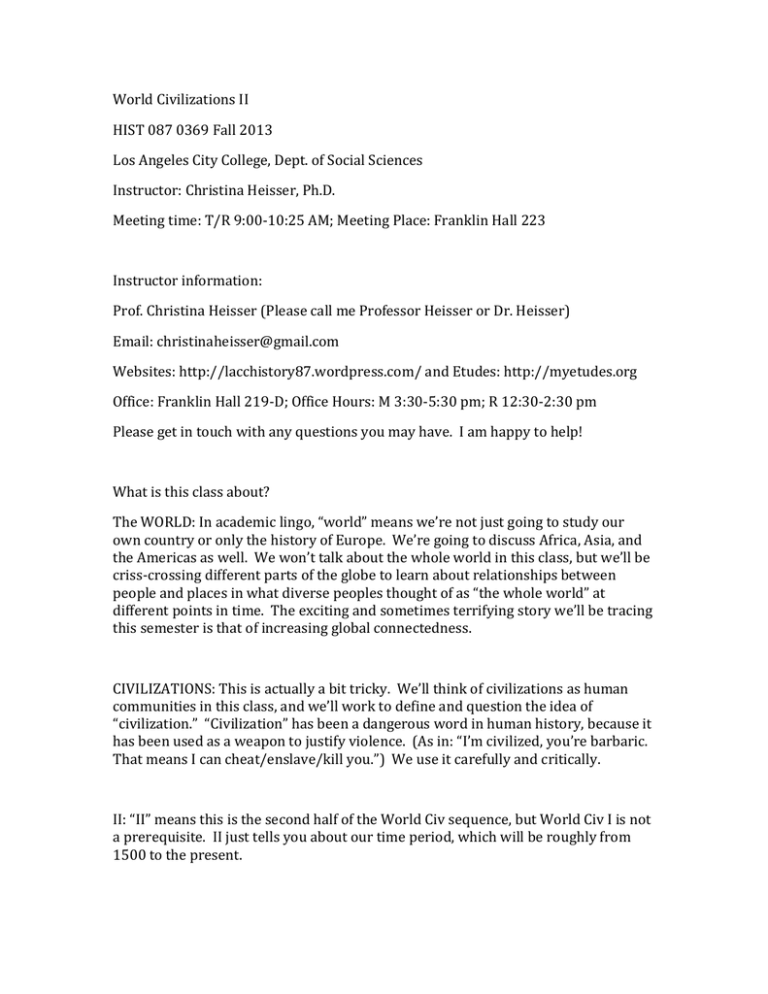
World Civilizations II HIST 087 0369 Fall 2013 Los Angeles City College, Dept. of Social Sciences Instructor: Christina Heisser, Ph.D. Meeting time: T/R 9:00-10:25 AM; Meeting Place: Franklin Hall 223 Instructor information: Prof. Christina Heisser (Please call me Professor Heisser or Dr. Heisser) Email: christinaheisser@gmail.com Websites: http://lacchistory87.wordpress.com/ and Etudes: http://myetudes.org Office: Franklin Hall 219-D; Office Hours: M 3:30-5:30 pm; R 12:30-2:30 pm Please get in touch with any questions you may have. I am happy to help! What is this class about? The WORLD: In academic lingo, “world” means we’re not just going to study our own country or only the history of Europe. We’re going to discuss Africa, Asia, and the Americas as well. We won’t talk about the whole world in this class, but we’ll be criss-crossing different parts of the globe to learn about relationships between people and places in what diverse peoples thought of as “the whole world” at different points in time. The exciting and sometimes terrifying story we’ll be tracing this semester is that of increasing global connectedness. CIVILIZATIONS: This is actually a bit tricky. We’ll think of civilizations as human communities in this class, and we’ll work to define and question the idea of “civilization.” “Civilization” has been a dangerous word in human history, because it has been used as a weapon to justify violence. (As in: “I’m civilized, you’re barbaric. That means I can cheat/enslave/kill you.”) We use it carefully and critically. II: “II” means this is the second half of the World Civ sequence, but World Civ I is not a prerequisite. II just tells you about our time period, which will be roughly from 1500 to the present. Important dates: Last day to drop without a W: September 8 Campus closed: September 2, November 11, November 28-29 Final Exam: Thursday, December 12, 9:30-11:30 am What will you learn? At the end of this course, you will be able to: Explain key developments in world history from the sixteenth century to the present. (Assessed through exams, reading responses, and research paper) Compare and contrast the political, economic, and cultural traditions of major world civilizations. (Assessed through class discussions, reading responses, and exams) Read primary and secondary sources in history to understand main arguments, identify point of view/bias, and place in context of broader developments. (Assessed through short reading responses and essays) Make written and oral arguments about world history using appropriately cited evidence. (Assessed through participation in class discussion and essays) Why should you care? World history is a story of the world we live in and how it came to be. The battles, the love affairs, even the academic writings of five hundred years ago and more continue to affect our world today. When we study history, we can begin to piece together explanations of why the world is how it is. As we study world history this semester, we will better understand some of the smallest questions - like what brought you or me to live in L.A. - and the biggest ideas - like how technology changes the way the world works. Knowledge is power, and being informed about the world we live in gives you power: by preparing you to sound smart in conversation with a potential boss or allowing you to disregard racist, sexist, or classist ideas dressed up as fact or history. In addition to the content you learn in this class, the skills that you will practice are essential for any informed citizen or professional career. In this class, you will ask questions to identify bias and find meaning in confusing texts or in strange pictures. This practice will help you to better read between the lines for office politics in an email from your boss, decipher political rhetoric, and maybe even comprehend Ikea manuals. You will compose essays using evidence to support an argument - a skill that will help you advocate for proposals at work and win debates at the dinner table. If you already know how to do all these things, this class will give you an opportunity to continue to perfect your skills. What will you do? Read. Books. There is no textbook for this course. Instead, we’ll be reading history books that will help us to see connections among people and economies around the world. Course lectures will talk about the big picture, and readings will help us to understand what the big picture meant for individuals. Vermeer’s Hat: The Seventeenth Century and the Dawn of the Global World by Timothy Brook. ISBN-10: 1596915994; ISBN-13: 978-1596915992 The Slave Ship: A Human History by Marcus Rediker. ISBN-10: 0143114255; ISBN13: 978-0143114253. Fordlandia: The Rise and Fall of Henry Ford’s Forgotten Jungle City by Greg Grandin. ISBN-10: 0312429622; ISBN-13: 978-0312429621 Online Readings. In addition to these books, other readings may be assigned. They will either be available online via links or uploaded to Etudes or the course website. I’ll give you instructions in class about how to access these readings. Think. Ask. Discuss. It is your job to ask questions in this class, because it is by asking questions that we learn. A historian asks questions about objects - like the art pictured in this syllabus - and, more often, texts. I hope you will ask relentless questions in this class - of me, of your classmates, of the things we read and look at together. Don’t be afraid to be curious (though we may not always find the answer) and don’t be afraid to look silly - chances are someone else has the same question. Write. We will do a lot of writing in this class. It is the primary way that you will be evaluated. English 28 is recommended for the class, and it will make your life much easier if you have taken English. That said, please know that I believe that everyone can write. Like most things in life, lots of practice makes you a better writer. We will be doing a lot of practice. Like most things worth doing, good writing takes a lot of work. What you put into it in effort will show in your final product, and effort will be rewarded. The final paper for this class will be a research paper on a subject of your choosing. We will be going step-by-step through the research process this semester so that when you sit down to write your final paper, you will have the tools to do it. If you have never written a research paper, you are not alone! We will work through the paper together as a class, and I am always happy to answer any of your questions. Send me an email, post a comment to the course blog, message me on Facebook, or stop by my office during office hours. I’m also happy to look at your drafts of assignments in advance of the due date and give you feedback and advice. I want you to do well, and I am glad when I can help that happen. Week-by-week: A tentative program Week 1 Introductions; New Empires in the 16th-17th Centuries Week 2 The Ecological Revolution of the 16th-17th C; Vermeer’s Hat Week 3 Mental Revolutions: Religion and Science in the 16th-17th C, Vermeer’s Hat Week 4 States and Societies: Political and Social Change in the 16th-17th C, Vermeer’s Hat Week 5 Driven by Growth: The Global Economy in the 18th C, Slave Ship Week 6 The Age of Global Interaction: Expansion and Intersection of 18th-C Empires, Slave Ship Week 7 The Exchange of Enlightenments: 18th-C Thought, Slave Ship Week 8 Replacing Muscle: The Energy Revolutions, Fordlandia Week 9 The Social Mold: Work and Society in the 19th C, Fordlandia Week 10 Western Dominance in the 19th C: The Westward Shift of Power, Fordlandia Week 11 The Changing State: Political Developments in the 19th C, Fordlandia Week 12 World Order and Disorder: Global Politics in the 20th C Week 13 The Pursuit of Utopia: Civil Society in the 20th C Week 14 The Embattled Biosphere: The 20th-C Environment Week 15 Finish up; review for final exam Assignments and Deadlines: Exams: Midterm: October 24; Final: December 12. Both will include multiple choice and essay questions. There will be no makeup exams. Book review: 3-4 pages. Due October 10. This will be a short paper on one of the books we read together in class. We’ll go over the format together in class. Research paper: 5-6 pages. This is the major project for this class. If this is the first research paper you have ever written, don’t worry - we will be doing lots of work in class to make sure that you feel prepared to write it. Topic proposal/consultation: Week 8 Annotated bibliography: Week 10 Rough Draft/Peer Review: Week 12 Final Draft: Week 13 Reading responses: Short (100 words) responses to the reading, submitted via Etudes. You can skip 5 and still get full points. If you skip less than 5, you get 1 extra credit point for each extra response. Responses must be submitted before the class in which the reading is due. Additional short writing and in-class writing: There may be short assignments you’ll do instead of reading responses, and there will also be in-class writing you’ll turn in. In-class writing will fall under the “participation” portion of your grade. Plagiarism Plagiarism is the ultimate sin in academic life – it is passing someone else’s work off as your own. The penalty for plagiarism is a zero on the assignment. This means that one bad choice can seriously affect your grade. To avoid plagiarism: 1. Use quotation marks if you are borrowing someone else’s words. 2. Cite any source from which you get words or ideas. To cite is to make it clear in your writing that an idea came from a book or website that you read. We’ll discuss in class how to cite your sources, and there are various online guides you can consult as well. If you have questions about whether something is plagiarism, ASK before you turn in the assignment. I am happy to help with your questions! Grading Midterm Exam: 100 points (10%) Final Exam: 150 points (15%) Book Review (3 pages): 100 points (10%) Final draft of research paper: 200 points (20%) Homework (Graded on satisfactory/unsatisfactory completion): 350 points (35%) Reading responses: 250 points (25%) Proposal/Consultation: 25 pts. Annotated bibliography/progress report: 25 pts. Rough draft: 50 pts. Participation: 100 points (10%) Pop quizzes: ? Total points = 1000+ Grade A: 900-1000 pts. An “A” student does assigned reading and homework, asks questions, participates in course discussions and does particularly insightful and interesting work on exams and papers. Grade B: 800-895 pts. A “B” student, like an “A” student, does all assigned coursework, asks questions, and participates in discussion. They also do above average work on exams and papers and make plausible arguments using evidence. Grade C: 700-795 pts. This student does most homework and asks some questions and participates sometimes in discussion. This student is able to identify historical events but fails to interpret meanings. Grade D&F: D: 600-695 pts.; F: less than 600 pts. This student does not read course material or participate in class. Exam scores are low and/or they miss a substantial number of examinations or quizzes. This student is unable to identify historical events and fails to interpret meanings. Extra credit: Weird word wall You can earn up to 15 points extra credit throughout the semester through this game. Post weird words you came across in your reading for the week and their definitions on the “comments” section of the course website: http://lacchistory87.wordpress.com/weird-word-wall/. Words may be vocabulary that is new to you or an odd word that you came across while reading. Bold words from the textbook or words that are otherwise defined by the author do not count! The rules of the game: Each weird word and definition is worth one point extra credit. No repeats will receive credit. I reserve the right to disqualify entries for insufficient oddness or difficulty. An entry must include three parts to receive credit - (1: A quote from the book in which the word appears, with the page number; (2: A definition and source. Cutting and pasting is fine, but remember to use quotation marks; (3: A definition or explanation of meaning in your own words. Example: gimcrack: 1- "a gimcrack air of instant shabbiness" (590, combined volume) 2- gimcrack: “cheap, shoddy” http://www.merriamwebster.com/dictionary/gimcrack 3- gimcrack is a way to describe badly made, inexpensive things Other ways to play: If another student has already posted your word, you may also earn one point extra credit by using a word in a sentence that is relevant to the chapter's contents. To earn half a point, you may write a sentence using the word creatively without referring to the chapter's contents. Students may only receive credit for one entry per week, and they may only add entries in the week a given chapter has been assigned. Sentences must be original from your own brain, not from Google or any other source. Close copies of previous sentences will not receive credit. Finally, you can earn one point extra credit by posting an image, video clip or article relevant to the week’s class. Make sure to include the source! Rules, Regulations, and other Fine Print Attendance: Attendance is vital to the successful completion of this course. Exams and papers will build off lectures and in-class discussion, and your participation is essential for your learning and for the learning of your classmates. You are considered absent if you are late or leave class early (NO EXCEPTIONS). All students are permitted two free absences. Beginning with the third absence, absences will reduce your final grade. Students with more than four absences (unexcused and excused included) will be dropped from the course. Disruptive behavior or lack of preparation can result in the expulsion of the student from class. Consult the current calendar for information concerning holidays, drop dates, registration, etc. It is the student’s responsibility to follow those dates. If you miss class, you will need to get any necessary information from your classmates. It is a good idea to exchange contact info with someone in the class. Tardiness: Tardiness or coming in late to class is disruptive to the class and to the instructor. If you are not here when your name is called during roll, you will be marked absent for the day. No student will be admitted more than 5 minutes after the scheduled start of class. Dropping the Class: It is the student’s responsibility to officially drop the class whenever he or she determines that he/she can no longer attend the class. Failure to drop a class officially may result in a failing grade and/or a financial obligation to the college. Important! Drop Date Information The deadline to drop without a “W” is the last day of Week 2 (of the semester), which is Sunday, September 8th for Fall 2013. If you must drop a course, drop before the specified deadline for dropping a class without a grade of "W." Dropping after Week 2 will result in a “W” on your transcript. Effective since July 1, 2012 students now have just 3 attempts to pass a class. If a student gets a "W" or grade of "D", "F", “I”, or "NP" in a class, that will count as an attempt. A student’s past record of course attempts district wide will also be considered. Therefore, before the end of Week 2 you should carefully consider if you can reasonably manage this course with the other factors in your life (e.g. work, family, course load). If you think you will not be able to complete this course with a C or better, drop by Sunday, September 8th. If you have any questions, please don’t hesitate to talk to me. You may also see a counselor in the Counseling Center in AD 108. Short-term classes: Drop dates for short-term classes are not the same as full semester classes. For specific deadline dates, please contact the Admissions Office. If you need help paying for books and other college expenses, call the Financial Aid Office at (323) 953-4000 extension 2010, or see them at Student Services Village room 117 http://www.lacitycollege.edu/stusvcs/finaid/ Disability Information: Students with a verified disability who may need authorized accommodation(s) for this class are encouraged to notify the instructor and the Office of Special Services (SSV 100, 323-953-4000, ext. 2270) as soon as possible, at least two weeks before any exam or quiz. All information will remain confidential. Cell Phone/Computer/Electronic Device Policy: Students may not use cell phones to accept or make calls while in class. They must be turned to silent mode. Computers or tablets are permitted solely for note-taking or research, and no inappropriate uses during class. Students who do not adhere to this policy will be asked to leave class. If there is a second occurrence, the student will be referred to the VP of Student Services, and will return to class after the VP has cleared her or him to return. Academic Dishonesty/Cheating – Board Rule 9803.28: Violations of Academic Integrity include, but are not limited to, the following actions: cheating on an exam, plagiarism, working together on an assignment, paper or project when the instructor has specifically stated students should not do so, submitting the same term paper to more than one instructor, or allowing another individual to assume one’s identity for the purpose of enhancing one’s grade. Class Conduct: Please treat all class members with respect. Please familiarize yourself with the Student LACC Code of Conduct for guidelines on acceptable and unacceptable conduct. Disputing Grades: If you choose to dispute your grade for the course you must submit a type-written, double-spaced letter explaining why you believe your grade was not appropriate to the work you have completed. You must attach all supporting papers, exams, homework assignments and all applicable materials to support your case. I will review your information and make a determination if a grade change is warranted. As a reminder, as I review your information, your grade may be lowered due to my error in giving you a higher grade than you actually earned. You are responsible for your own performance and grade. Note: This syllabus is tentative and subject to change. I may amend, add, and/or delete any of the items. You will be notified of any changes. My citations: Thanks go to my colleagues in the Faculty Teaching and Learning Academy (FTLA) and LACC Social Sciences Department for providing inspiration, help with the fine print (some of which is reproduced word-for-word here), and constructive feedback. Most images in this syllabus were taken from the Metropolitan Museum of Art Timeline of Art History (metmuseum.org/toah/). Book images came from Google Images.
